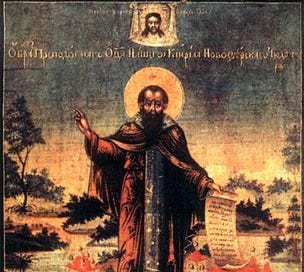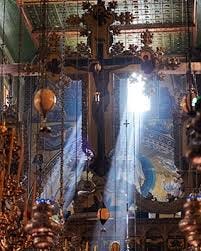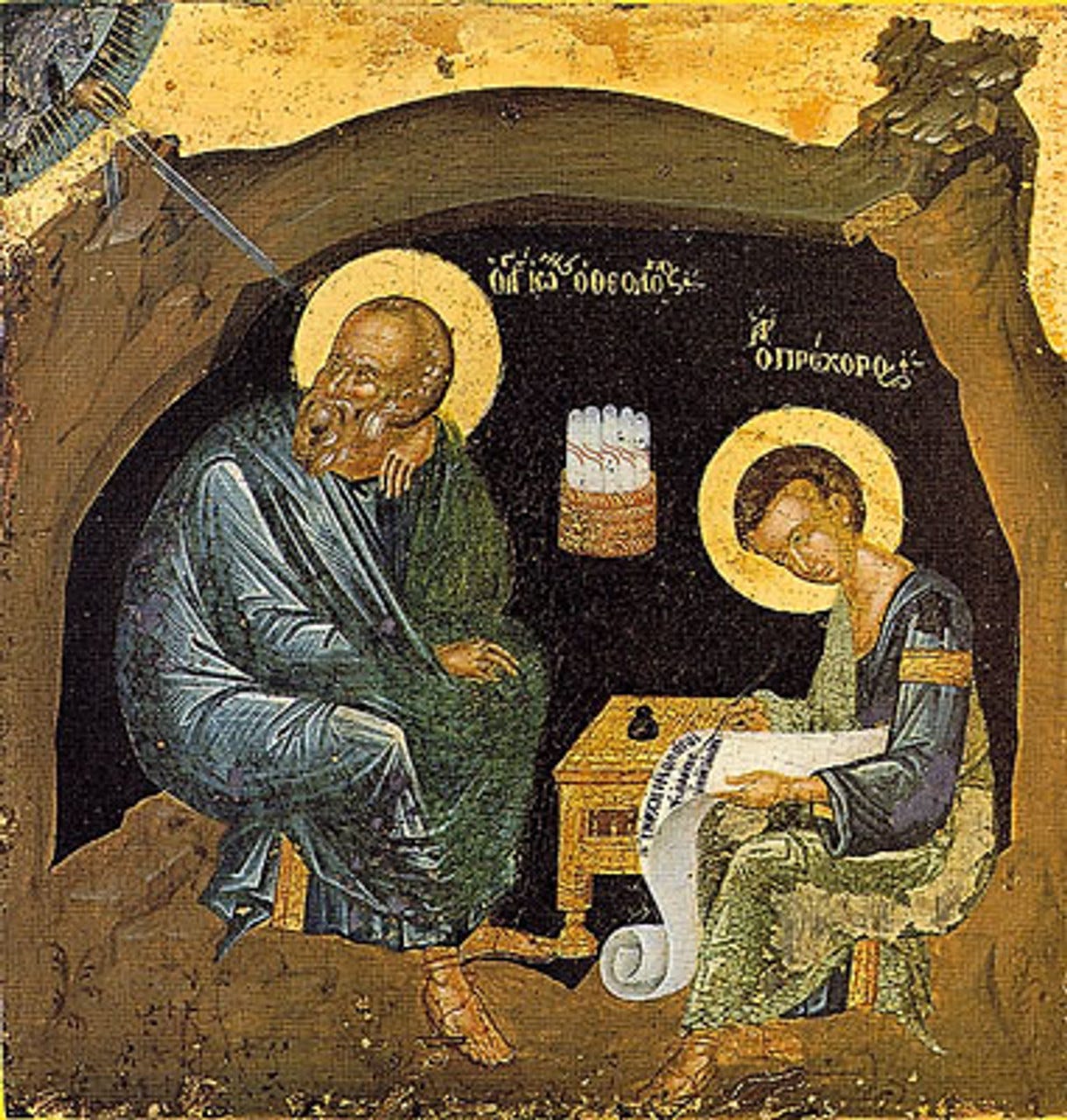“When a sunbeam falls on a transparent substance, the substance itself becomes brilliant, and radiates light from itself. So too Spirit-bearing souls, illumined by Him, finally become spiritual themselves, and their grace is sent forth to others. From this comes knowledge of the future, understanding of mysteries, apprehension of hidden things, distribution of wonderful gifts, heavenly citizenship, a place in the choir of angels, endless joy in the presence of God, becoming like God, and, the highest of all desires, becoming God.”
St. Basil the Great
1 Peter 3:10-22
Brethren, “He that would love life and see good days, let him keep his tongue from evil and his lips from speaking guile; let him turn away from evil and do right; let him seek peace and pursue it. For the eyes of the Lord are upon the righteous, and his ears are open to their prayer. But the face of the Lord is against those that do evil.” Now who is there to harm you if you are zealous for what is right? But even if you do suffer for righteousness’ sake, you will be blessed. Have no fear of them, nor be troubled, but in your hearts reverence Christ as Lord. Always be prepared to make a defense to any one who calls you to account for the hope that is in you, yet do it with gentleness and reverence; and keep your conscience clear, so that, when you are abused, those who revile your good behavior in Christ may be put to shame. For it is better to suffer for doing right, if that should be God’s will, than for doing wrong. For Christ also died for sins once for all, the righteous for the unrighteous, that he might bring us to God, being put to death in the flesh but made alive in the spirit; in which he went and preached to the spirits in prison, who formerly did not obey, when God’s patience waited in the days of Noah, during the building of the ark, in which a few, that is, eight persons, were saved through water. Baptism, which corresponds to this, now saves you, not as a removal of dirt from the body but as an appeal to God for a clear conscience, through the resurrection of Jesus Christ, who has gone into heaven and is at the right hand of God, with angels, authorities, and powers subject to him.
Mark 12:18-27
At that time, Sad’ducees came to him, who say that there is no resurrection; and they asked him a question, saying, “Teacher, Moses wrote for us that if a man’s brother dies and leaves a wife, but leaves no child, the man must take the wife, and raise up children for his brother. There were seven brothers; the first took a wife, and when he died left no children; and the second took her, and died, leaving no children; and the third likewise; and the seven left no children. Last of all the woman also died. In the resurrection whose wife will she be? For the seven had her as wife.” Jesus said to them, “Is not this why you are wrong, that you know neither the scriptures nor the power of God? For when they rise from the dead, they neither marry nor are given in marriage, but are like angels in heaven. And as for the dead being raised, have you not read in the book of Moses, in the passage about the bush, how God said to him, ‘I am the God of Abraham, and the God of Isaac, and the God of Jacob’? He is not God of the dead, but of the living; you are quite wrong.”
Venerable Cyril the Wonderworker, Abbot of Novoezersk, Novgorod
Saint Cyril of New Lake was born into a pious family. The Lord marked him as one of the chosen even before he was born. Cyril’s mother was praying in church during the Divine Liturgy, and the infant in her womb cried out, “Holy, Holy, Holy, Lord of Sabaoth!”
From the time of his childhood the saint was fond of solitude and prayer, and he dreamt of monastic life. At fifteen years of age Cyril secretly left his parental home, intending to enter the Pskov Caves monastery. He did not know the way to the monastery, and took nothing from home for the journey. He went his way, putting all his trust in the Lord and His All-Pure Mother. Twenty versts from the city the youth met a magnificent monastic Elder, who led him to the monastery. As he left, he blessed him with the words, “May God bless you, my child, and grant you the angelic schema, and may you be a chosen vessel of the Divine Spirit.” Having said this, the Elder became invisible. The boy realized that this had been a messenger from God, and he gave thanks to the Lord.
The igumen Saint Cornelius (February 20) saw with his clairvoyant eye the grace manifest in the young man. He provided him with much guidance and tonsured him into the monastic schema with the name Cyril. The fifteen-year-old monk astonished the brethren with his efforts. He emaciated the flesh through fasting and prayer, and zealously fulfilled obediences. Day and night he was ready to study the Word of God. Even then he thought to end his days in solitude in the wilderness.
The boy’s parents mourned him as one dead, but once an Elder of the monastery of Saint Cornelius came to them and told them about their son and his life at the monastery. The joyful news confirmed in Cyril’s mother her love for God. She spoke with her husband about leaving to the monastery her portion of the inheritance, then left the world and became a nun with the name Elena (Helen). She died in peace a short time later.
The saint’s father came to the monastery, and Igumen Cornelius told Cyril to meet with him. The saint was troubled, but not daring to disobey the igumen, he fell down at his father’s feet, imploring forgiveness for secretly leaving home. The father forgave his son, and he himself remained at the monastery. Saint Cornelius tonsured him into monasticism with the name Barsanuphius, and gave him to his son for instruction.
Three years later, he peacefully fell asleep in the Lord. His son continued to toil more fervently for the Lord, disdaining his own will, and in was obedient not only to the igumen, but also to the brethren. He thirsted to go about all the Russian land, venerating its holy shrines and to find for himself a wilderness place for a life of silence.
With the blessing of Saint Cornelius, Saint Cyril left the monastery in which he had grown strong spiritually, and he went to the coastal regions, roaming through the forests and the wild places, eating tree roots and berries. The saint spent about twenty years in this difficult exploit of wanderer, and he went to the outskirts of Moscow, Novgorod and Pskov, but he never entered any house nor did he accept alms. He wandered about during the day, and spent his nights at prayer on church porches, and he attended the church services.
Once while at prayer, Saint Cyril saw a heavenly light indicating the direction where he should found a monastery. He set off on his way at once, and having reached the Tikhvin monastery, he spent three days and three nights there in ceaseless prayer to the Most Holy Theotokos. The Mother of God appeared to him in a dream. Showing Her approval of him, She said, “My servant Cyril, pleaser of the Most Holy Trinity, go to the Eastern region of White Lake, and the Lord My Son will show you the place of rest for your old age.”
The saint proceeded to White Lake, weeping copious tears at the miraculous vision. On the lake he saw a small island, from which a pillar of fire rose up to the sky. There, beneath a centuries-old spruce tree, Saint Cyril built a hut, and then set up two cells: one for himself, the other for future brethren. The hermit also constructed two small churches, one in honor of the Resurrection of Christ and the other in honor of the Mother of God Hodēgḗtria. He underwent many temptations from invisible enemies, and from idlers roving about, but he overcame everything by brave endurance and constant prayer. News of his holy life spread everywhere, and brethren gathered around him.
There were many instances of healing through his prayers, and the Lord also granted His saint the gift of foresight. Sensing his impending end, Saint Cyril summoned the brethren. With tears of humility the saint instructed his spiritual children one last time, until his voice gave out. For a long time then he was silent, but suddenly he cried out with loud sobbing, “I go to the Lord unto life eternal, but I entrust you to God the Word and His Grace, bestowing an inheritance and sanctification upon all. May it help you. But I beseech you, do not become lax in fasting and prayers, guard yourself from the snares of the Enemy, and the Lord in His ineffable mercy will not condemn your humility.”
Having said this, the saint gave a final kiss to the brethren, received the Holy Mysteries, signed himself with the Sign of the Cross, and with the words “Glory to God for everything!” he gave up his pure soul to the Lord on February 4, 1532.
Revelation: Removing the Veil
Metropolitan Athanasios of Limassol
Part 1
The Revelation of the Apostle John is the last book of the New Testament. The New Testament is not one book, but a collection of twenty-seven books. The last book, the Revelation of the holy Apostle and Evangelist John the Theologian, was also the last to be written. It’s a prophetic text that speaks about future events, about events that are taking place, and about events that have already happened, explaining them in a peculiar way, through images, visions, inspiration, and the use of symbols. The holy Apostle John, while on Patmos, saw what God showed him. If you’ve been to the island of Patmos, you know there is still the cave where the Apostle John, while in prayer, saw the revelation described in the book of Revelation.
The word “apocalypse” means “to remove the veil from that which is hidden, that which is in darkness, that which is covered.” It’s the appearance of things, events, and messages that God wants to convey to man. And this revelation was given by God to the Apostle John because we needed to know it. Why do we need to know it? The path of this world is linear; it leads to an end. Christ told us about the end of the world; He told the world that it will end one day.
Certain events and signs will occur before the end, and it’s important for us Christians to be very attentive: Watch and pray, that ye enter not into temptation (Mt. 26:41). This is the message of Christ. Why is He talking about temptation? Because the closer we get to the end, the more false christs and false prophets will appear. Heresies will multiply, and many people will appear posing as prophets, people of God, saints, and those who receive messages from God.
What will all these false prophets be looking for? They will draw the people after themselves. It’s very dangerous, because it’s not just bodily harm. For example, someone can kill us, they can chop off our heads. This evil will affect only our body. Sooner or later, we’re going to die. If they cut our heads off a few years earlier, the world won’t collapse. But if we lose our soul, that’s eternal destruction. If we’re tempted, it’s for all eternity. It’s better for a man to die, to harm his body, than to lose his soul. But false prophets, false christs, false messiahs seek to destroy our souls, to lead us astray from the true path.
The pursuit of truth isn’t some kind of ideology—it’s the Church. Christ made His Church the pillar and ground of truth (Tim. 3:15). The Body of Christ is the Church (all of us, not just the bishops, priests, and deacons), just as the Apostles and saints organized and handed it down to us. And the Church is the keeper of the truth, the keeper of the books of the New Testament. But the books of the New Testament have no value unless their truth is sealed by the Church. The Church chose twenty-seven books and said they contain the truth, and they constitute the God-inspired books of Holy Scripture.
In the epistles of St. Athanasios the Great, we read that, according to the decisions of the Councils of bishops of the Church taking place at that time, many books of Holy Scripture (a few in particular, including Revelation) weren’t accepted by individual Local Churches. Some of the Local Churches believed that the Revelation of St. John the Theologian didn’t belong to the collection of the books of the New Testament, like the Epistle of the Apostle Paul to the Hebrews. Nowhere does it say that the Gospel of Matthew was written by the Apostle Matthew, or that the Gospel of Mark was written by the Apostle Mark. It was the Church that sealed that this text belongs to St. Mark, this one to St. John, this one to St. Paul. The Church established this.
There have been heresies since the first year after the Ascension of the Lord to Heaven and the beginning of the Apostolic preaching. The heretics tried to remake Apostolic Tradition according to their own perception and way of thinking. What did they do? They wrote texts and said this text was written, for example, by the Apostle Paul. And in those times, how could they figure out who wrote it? They signed it from St. Paul, from St. John, from St. Thomas, and offered them to Christians—the so-called apocryphal gospels that everyone’s afraid of.
The apocryphal gospels are mainly texts written by heretics, mostly Gnostics (a heresy in the early years of the Church’s existence, which greatly confused people at those times). They wrote texts, signing them with the names of the Apostles—St. James, St. Thomas, St. Paul, and distributed them among Christians, causing great confusion. Christians did not know the precise authorship of many texts.. Are they true? Are they authentic? It was a mess. The Church said then: “We accept as true only those texts that were written by the disciples of Christ, based on the view of the disciples of the Apostles.” There were disciples of the Apostles who were still alive then—St. Polycarp, St. Ignatios, and other successors of the Apostles who know what their teachers spoke about.
Today we often hear nonsense and even blasphemy attributed to St. Paisios. I lived by him for sixteen years and never heard such things from him. But someone who came to him once, or maybe didn’t even see him, is writing all kinds of stuff about him. But those of us who were close to him, listened to him, and knew what he spoke about, can judge whether Elder Paisios said all these absurdities that are attributed to him. Even during his lifetime people would come and say, “Elder Paisios said the war will start in three days!” He didn’t say anything like that, but these words were passed around orally.
Once a man came to him and said: “Geronda, in Athens we heard that the war is starting. Is that true?”
“Okay, and what are you thinking about doing if a war breaks out?”
“It’d be good to know if a war is starting. Then we’d go buy more of everything.”
“What do you plan to buy?”
“Milk, salt.”
“My dear, if the war starts, you’re going to go drink milk? Are you going to go cook something to eat? If a war breaks out, your mind’s going to turn to food and you’re going to rejoice that your cupboards are full? And if you don’t stock up on anything, will you feel like you’re in danger? What are you thinking?”
People often distorted the meaning of his words. One time a man came and visited him and said in their diocese they had such and such a bishop. The Elder said he knew him. Then this man went to the bishop and said, “I went to Elder Paisios and he said he knows you, and how wonderful you are!” But the Elder didn’t say anything like that.
Another time, a monk, a bit of a loafer, simple, intrusive, somewhat rude, came to see him in his kallyvia. He came and sat with Geronda for hours. The Elder got upset and asked him: “Since you have no questions, give me ten minutes to be in silence and pray.” The monk continued to sit and ask him about the weather, whether it would rain, whether the tomatoes would grow, whether the grapes would ripen. Did Geronda have time for such things? But he didn’t want to upset the monk. Then he invited him to go to church together and read the Psalter. The monk sat down in the church and the Elder went to read the Psalter. He only had one lung, so from time to time he would stop to take a deep breath. A man came up to the window of the church, and the Elder indicated to him to wait a little. This lazy monk left and then sent the Elder a letter. Listen to what he wrote: “It wasn't enough for you that you kept me at your place for so many hours, I lost so much of my time, but you also considered me to be possessed, took me to the church to read the Psalter over me, and then threatened me.”
Now it’s easy to make a statement, to tell people that you have nothing to do with this person, this theory, this news. You can inform society through the internet, radio, television, newspapers, and defend the truth. In the time of the Apostles, there was a serious problem in the Church until the era of St. Basil the Great: Heretics would write something, sign it with the names of saints, distribute their texts amongst the faithful, and this caused great confusion.
The Church said: “We accept nothing but what the Apostles, their successors, and the disciples of their successors taught us.” Thus appeared what the Church calls Apostolic Tradition. Who were the eyewitnesses of Christ? The Apostles. What the Apostles said is correct. Thus it was possible to gather the teachings of the Church and determine the canons of truth of the texts of Sacred Scripture. People could say these books are true, authentic, God-bearing, they make up the New and Old Testaments.
In this way, the Church resolved this difficult problem, which found its final conclusion in the epistles of St. Athanasios the Great. This is one of the answers to Protestants, Jehovah’s Witnesses, and everyone who says today: “We recognize only the Holy Scriptures, but not the Church and its Tradition.” But what are they saying? The Sacred Scriptures were determined by the Church, which said that they were Divinely inspired. St. Athanasios and the assembly of bishops said it. So how can you accept only the books that the Church chose while rejecting the Church itself? It’s absurd. The Church has established the authority and truth of Scripture. The Church is the seal of truth. The Church puts its seal on what is true and does not recognize what is false or falsified. The only reliable way of understanding and distinguishing what Christ said to us about false prophets, false messiahs, and false christs is the Church, the ark of truth and salvation.
This week’s calendar reminders:
Monday 2/3: Matins 8:30 am
Tuesday 2/4: no services or events
Wednesday 2/5: no services or events
Thursday 2/6: Matins 8:30 am
Friday 2/7: Matins 8:30 am
Saturday 2/8: Inquirer Class 4:30 pm; Great Vespers 6 pm
Sunday 2/9: Divine Liturgy 9:15am
CLICK BELOW to donate online:
Christ the Savior Orthodox Church is located in Southbury, Connecticut, and is part of the New England Diocese of the Orthodox Church of America.
Mailing address: Christ the Savior Church, 1070 Roxbury Road, Southbury, CT 06488
PLEASE DONATE to help our parish do the work of the Lord, thrive and grow, and extend the Kingdom of God. May the Lord bless your generosity!
Fr. Moses Locke can be reached at frmoseslocke@gmail.com












